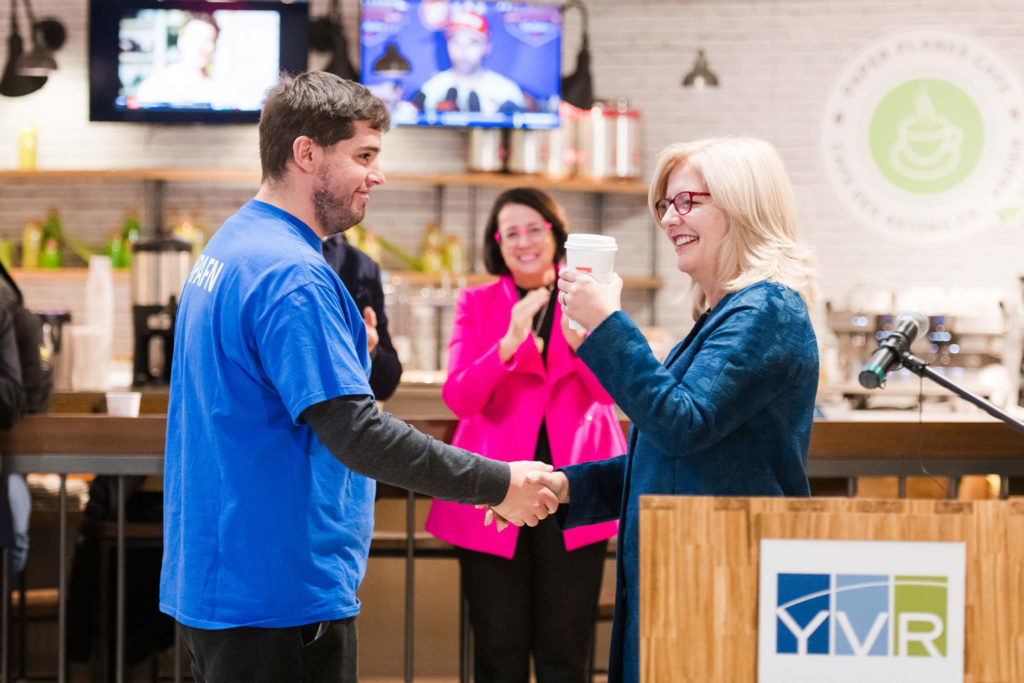People with autism see the world through a slightly different lens—lights can appear too bright, noises might sound too loud. As a result, working in a busy environment like a restaurant can be kryptonite for those on the spectrum.
But this didn’t deter the Pacific Autism Family Network (PAFN) from opening the country’s first neurodiverse café inside Canada’s second largest airport in the fall of 2023. Located in the busy domestic arrivals area of the Vancouver International Airport, Paper Planes Café hires and trains employees with neurological differences in the art of customer service, order taking and latte making.
The business’s lofty purpose is posted on the wall for travellers to see: “We’re a coffee shop on a mission to empower autistic and neurodiverse individuals, providing meaningful employment opportunities.” Employees are paid a living wage of $24 per hour, and after a six-month stint at the café they earn their “hospitality wings” and the PAFN team helps them find employment elsewhere.
The social enterprise is the brainchild of Wendy and Sergio Cocchia, a Vancouver couple that started the PAFN in 2016 to support families living with the lifelong developmental disorder that impacts one in 50 Canadian children and adolescents. The Cocchias, whose adult son has autism, dreamed of one day helping members of the autism community find work.
Related: Is Your Workplace Supporting Neurodiverse Employees?
“Employment really is the conduit to leading a meaningful life,” says Sergio, noting that most families with a member on the spectrum want two things for their child: a friend and a job. The café provides both.
Trainees start out working shorter shifts of two to four hours to help them build confidence and get used to the sounds and space. With support from neurotypical managers and mentors, they learn how to take and fill customer orders while progressing through a skills checklist that includes everything from wearing an apron properly to completing a transaction.
But the training program is about more than just mastering practical tasks like making and serving coffee and sandwiches. “It’s also about the soft skills and the social skills that are incredibly important to any kind of employment,” says Wendy.

Trainees get to practice smiling, having friendly conversations with customers and problem solving, crucial assets when working in hospitality. Support staff are there to guide them when it gets busy—the café serves about 100 customers a day—and to help them manage issues like sensory overload.
The venture is funded through a partnership with the Vancouver Airport Authority, which made a five-year commitment to PAFN for $500,000. In return, PAFN is training 25 per cent of airport authority staff in autism awareness and sensitivity, so that frontline workers including CATSA security screeners, terminal officers and YVR Fire and Rescue members, among others, will have the skills to recognize and respond to neurodiverse travellers.
Additionally, the 95-square-metre space is being provided to the café rent-free, so that the PAFN can reinvest the business’s profits into supporting more employment opportunities for the autism community.
Related: How to Spot—and Stop—Unconscious Bias in Hiring
“It’s really important that our airport be fully inclusive and accessible,” says Vancouver Airport Authority CEO Tamara Vrooman. “This initiative allows us to make sure that our staff and our passengers are interacting with and seeing people with autism in a different way. We’re getting a cup of coffee when we go there—they’re getting a career.”
Tellingly, Paper Planes Café doesn’t count success in food and drinks sold, but in trainees graduated. “The only way we can measure success is the number of people we place and who get meaningful employment after the fact,” says Sergio.
So far, five employees have fledged from the café and are now stretching their wings in jobs outside of the YVR nest, with more following this spring. Paper Planes made their employment dreams possible, and in the process the café improved the airport experience for all passengers. That’s definitely good for business.
Source: canadianbusiness.com
